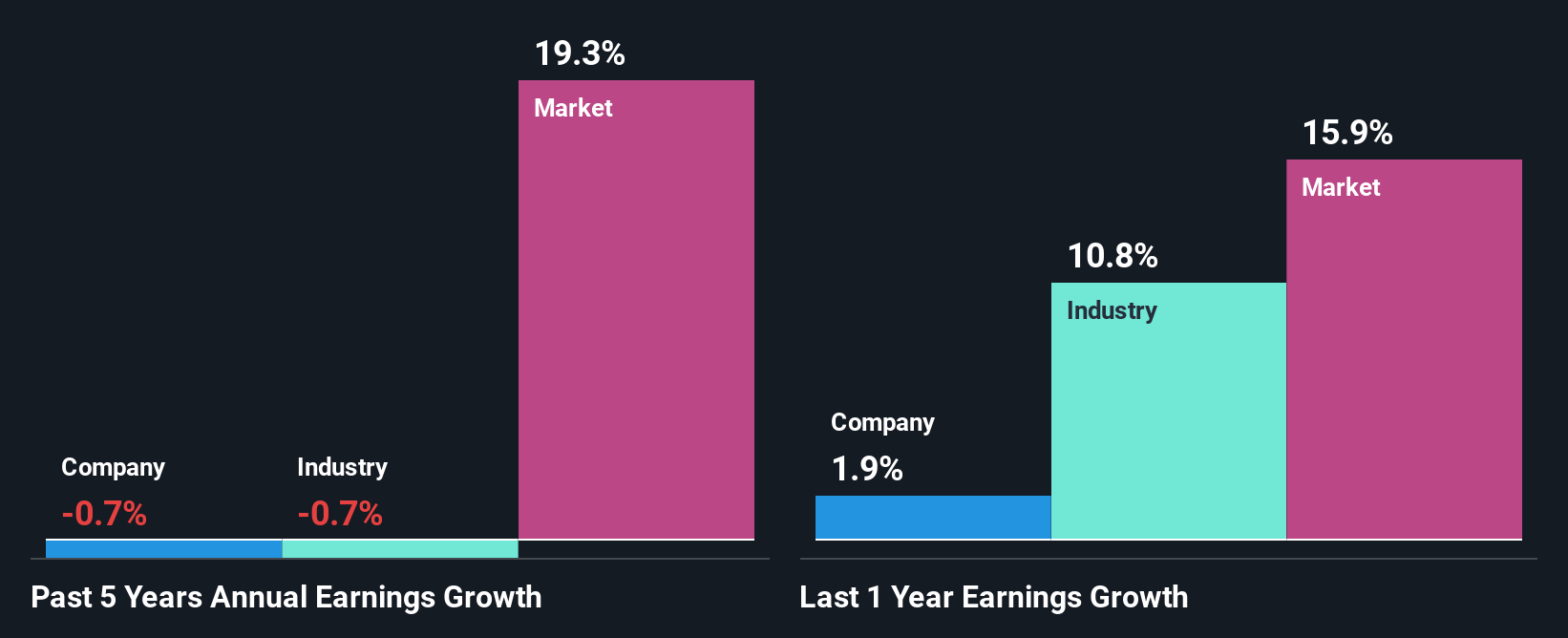- South Africa
- /
- Wireless Telecom
- /
- JSE:VOD
Do Its Financials Have Any Role To Play In Driving Vodacom Group Limited's (JSE:VOD) Stock Up Recently?
Vodacom Group's (JSE:VOD) stock is up by a considerable 6.6% over the past month. We wonder if and what role the company's financials play in that price change as a company's long-term fundamentals usually dictate market outcomes. Specifically, we decided to study Vodacom Group's ROE in this article.
Return on equity or ROE is a key measure used to assess how efficiently a company's management is utilizing the company's capital. Put another way, it reveals the company's success at turning shareholder investments into profits.
How Is ROE Calculated?
The formula for return on equity is:
Return on Equity = Net Profit (from continuing operations) ÷ Shareholders' Equity
So, based on the above formula, the ROE for Vodacom Group is:
19% = R20b ÷ R104b (Based on the trailing twelve months to March 2025).
The 'return' refers to a company's earnings over the last year. So, this means that for every ZAR1 of its shareholder's investments, the company generates a profit of ZAR0.19.
View our latest analysis for Vodacom Group
What Has ROE Got To Do With Earnings Growth?
So far, we've learned that ROE is a measure of a company's profitability. Based on how much of its profits the company chooses to reinvest or "retain", we are then able to evaluate a company's future ability to generate profits. Generally speaking, other things being equal, firms with a high return on equity and profit retention, have a higher growth rate than firms that don’t share these attributes.
Vodacom Group's Earnings Growth And 19% ROE
At first glance, Vodacom Group seems to have a decent ROE. Even when compared to the industry average of 22% the company's ROE looks quite decent. However, we are curious as to how Vodacom Group's decent returns still resulted in flat growth for Vodacom Group in the past five years. So, there could be some other aspects that could potentially be preventing the company from growing. For example, it could be that the company has a high payout ratio or the business has allocated capital poorly, for instance.
From the 0.7% decline reported by the industry in the same period, we infer that Vodacom Group and its industry are both shrinking at a similar rate.

Earnings growth is an important metric to consider when valuing a stock. It’s important for an investor to know whether the market has priced in the company's expected earnings growth (or decline). By doing so, they will have an idea if the stock is headed into clear blue waters or if swampy waters await. What is VOD worth today? The intrinsic value infographic in our free research report helps visualize whether VOD is currently mispriced by the market.
Is Vodacom Group Making Efficient Use Of Its Profits?
Vodacom Group has a high three-year median payout ratio of 72% (or a retention ratio of 28%), meaning that the company is paying most of its profits as dividends to its shareholders. This does go some way in explaining why there's been no growth in its earnings.
Moreover, Vodacom Group has been paying dividends for at least ten years or more suggesting that management must have perceived that the shareholders prefer dividends over earnings growth. Our latest analyst data shows that the future payout ratio of the company over the next three years is expected to be approximately 71%. However, Vodacom Group's ROE is predicted to rise to 24% despite there being no anticipated change in its payout ratio.
Summary
Overall, we feel that Vodacom Group certainly does have some positive factors to consider. However, while the company does have a high ROE, its earnings growth number is quite disappointing. This can be blamed on the fact that it reinvests only a small portion of its profits and pays out the rest as dividends. That being so, the latest industry analyst forecasts show that the analysts are expecting to see a huge improvement in the company's earnings growth rate. Are these analysts expectations based on the broad expectations for the industry, or on the company's fundamentals? Click here to be taken to our analyst's forecasts page for the company.
New: Manage All Your Stock Portfolios in One Place
We've created the ultimate portfolio companion for stock investors, and it's free.
• Connect an unlimited number of Portfolios and see your total in one currency
• Be alerted to new Warning Signs or Risks via email or mobile
• Track the Fair Value of your stocks
Have feedback on this article? Concerned about the content? Get in touch with us directly. Alternatively, email editorial-team (at) simplywallst.com.
This article by Simply Wall St is general in nature. We provide commentary based on historical data and analyst forecasts only using an unbiased methodology and our articles are not intended to be financial advice. It does not constitute a recommendation to buy or sell any stock, and does not take account of your objectives, or your financial situation. We aim to bring you long-term focused analysis driven by fundamental data. Note that our analysis may not factor in the latest price-sensitive company announcements or qualitative material. Simply Wall St has no position in any stocks mentioned.
About JSE:VOD
Good value with adequate balance sheet.
Similar Companies
Market Insights
Community Narratives



